SOLD
Rustic Hand-Woven 19th Century Antique Pure French Linen Fabric Made Stitch Raglan-sleeve Coat
1930年代フランスのPTT(Les Postes, Télégraphes et Téléphones=郵政電信電話局)のオフィサーコートをモデルとしたラグランスリーブのコートです。
This raglan-sleeved coat is modeled after the 1930s French PTT (Les Postes, Télégraphes et Téléphones = Post and Telegraph Office) officer’s coat.
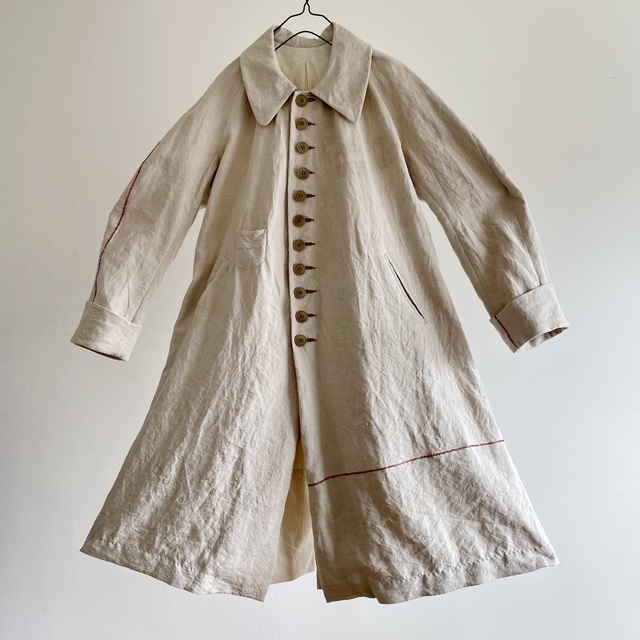
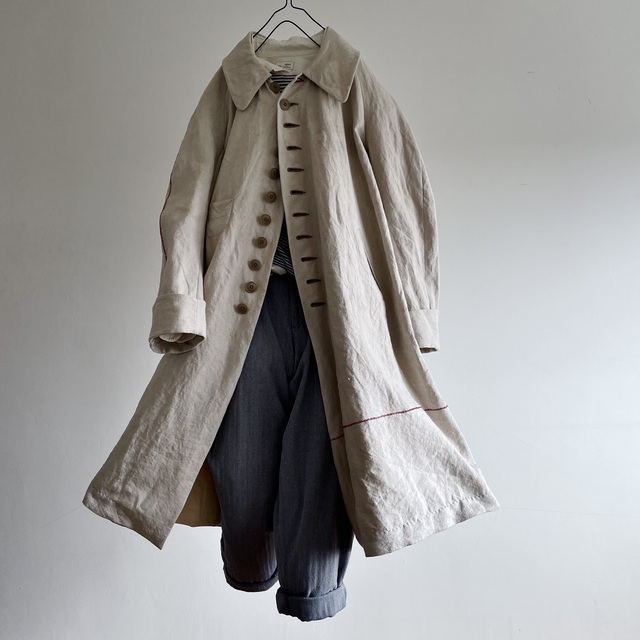
長めの丈とたっぷりした分量、使い込まれたアンティークリネンの生地感があいまった存在感あふれる1着です。
蹴回し分量が非常にたっぷり取られ、裾に向けてゆったりとしたトラペーズラインを描くシルエット。
The long length, generous volume, and used antique linen fabric combine to create a dress with a strong presence.
The silhouette is very generous around the hem, with a relaxed trapeze line toward the hem.
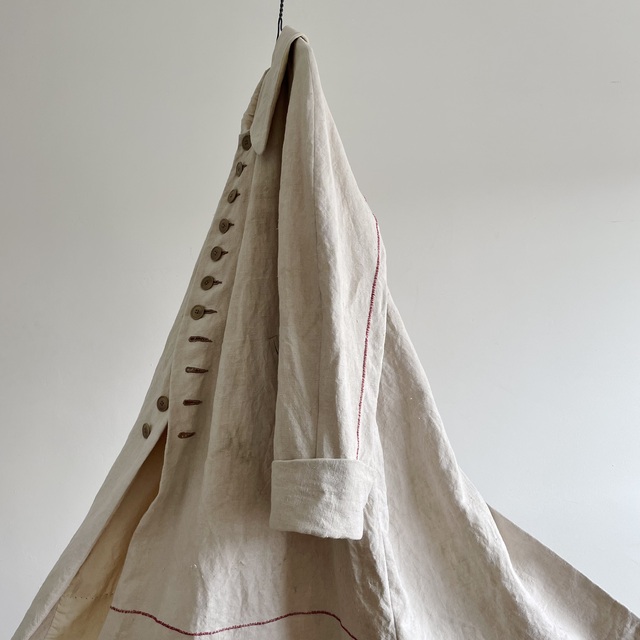
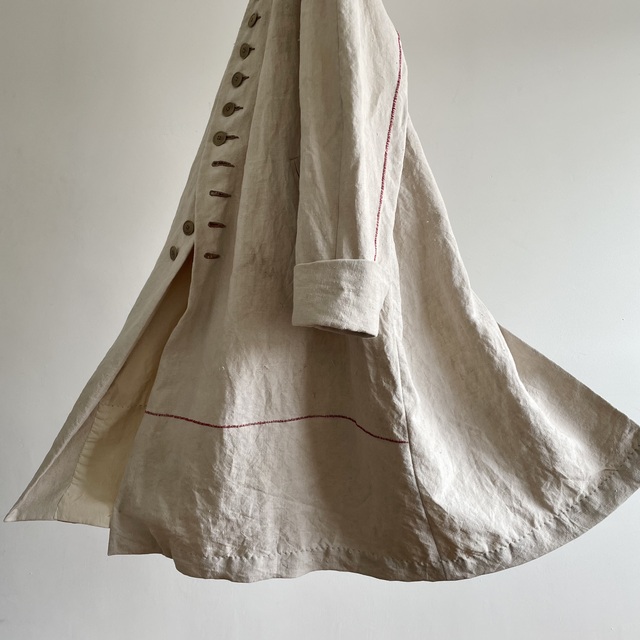
昔のフランスのワークウェアの良さは、何と言ってもテーラーワークを基本にしたパターンと縫製が作り出す立体的で曲線的なデザインと、雰囲気溢れる生地の表情。その流れを尊重した作り。
The beauty of old French workwear is the three-dimensional and curvy design created by tailor-work based patterns and sewing, and the expression of fabrics full of atmosphere. This is a production that respects this trend.
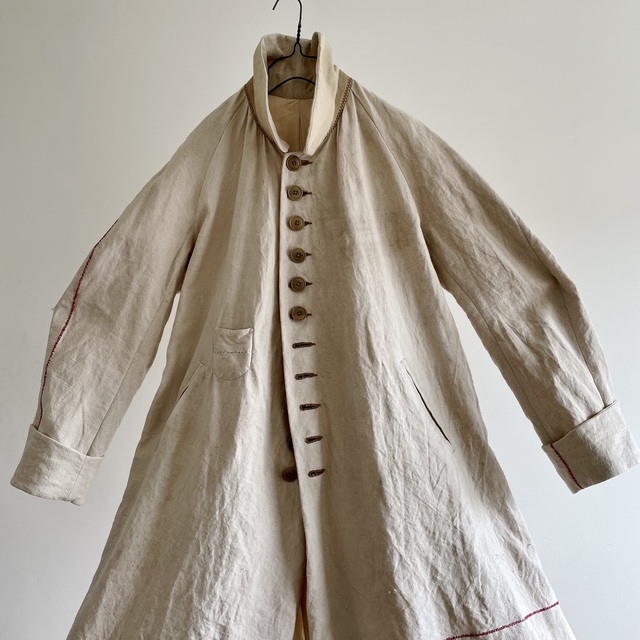
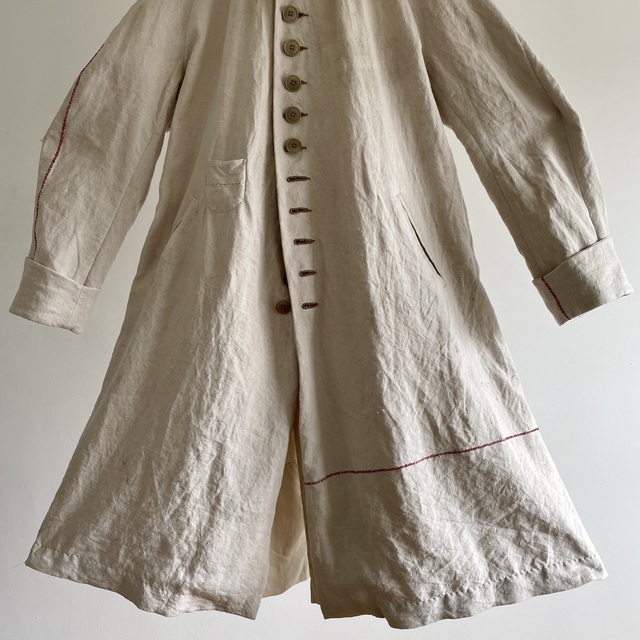
独自のスタイルを持ち現代に通用するモダンさを持ち、アメリカやイギリスのように、コントラストをつけた太く頑丈なステッチが、2重3重に入るタフで無骨なワークウェアとは全くの別世界の代物です。
It has its own style and is modern enough to be used today. It is a completely different world from the tough and rugged workwear with contrasting thick and sturdy stitching that is double or triple layered, as in the United States and England.
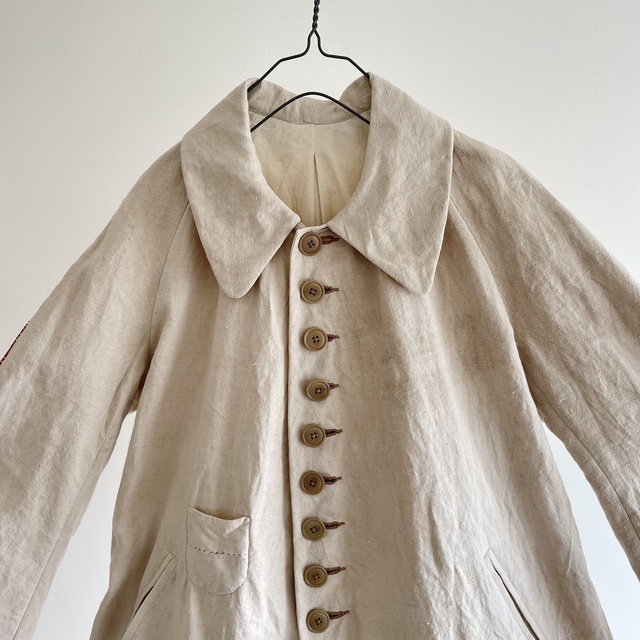
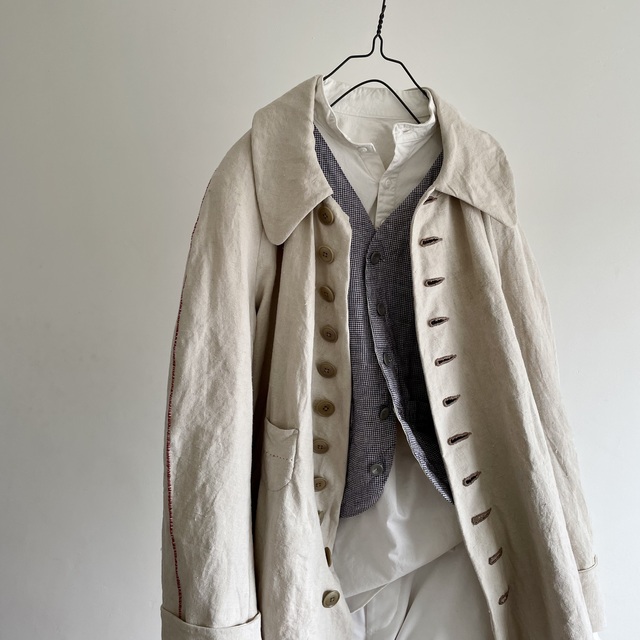
3枚袖のラグランというとても凝った袖の造り。肩の丸みだけではなく腕の曲線にも沿う立体感は、仕事着を超えたフランスならではのもの。
The three-piece raglan sleeves are very elaborate. The three-dimensionality that follows the curves of the arm as well as the roundness of the shoulder is something that can only be found in France, and goes beyond work clothes.
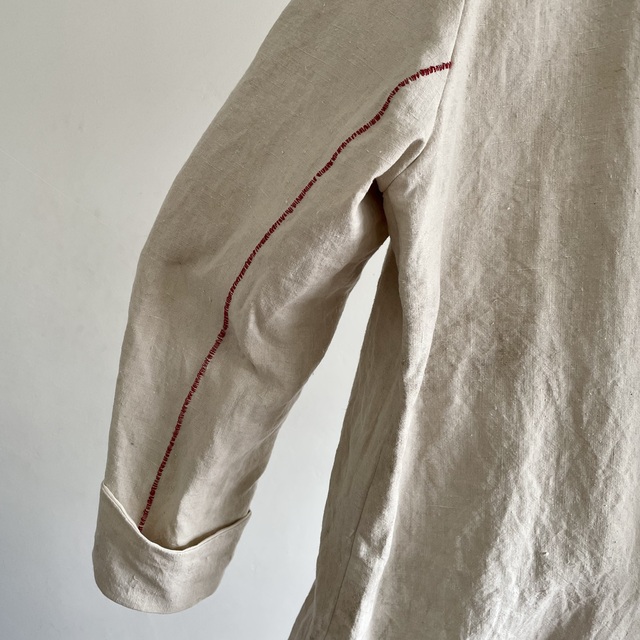
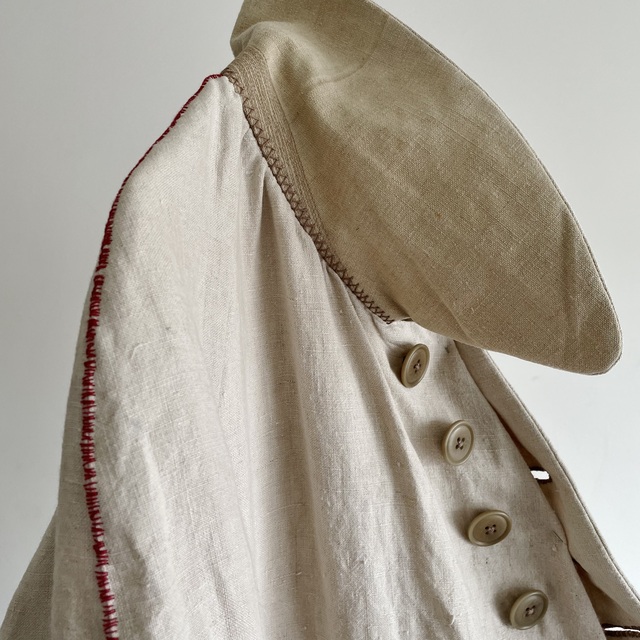
折り返し状のパーツを接いで作ることで、単純なターンナップよりもボリュームと仕立てのしっかりした造りの袖先。それは、仕事着にもスタイルを求めるフランスならではのもの。
By joining folded parts, the sleeve ends are made with more volume and tailoring than simple turn-ups. This is unique to France, where style is sought even in work clothes.
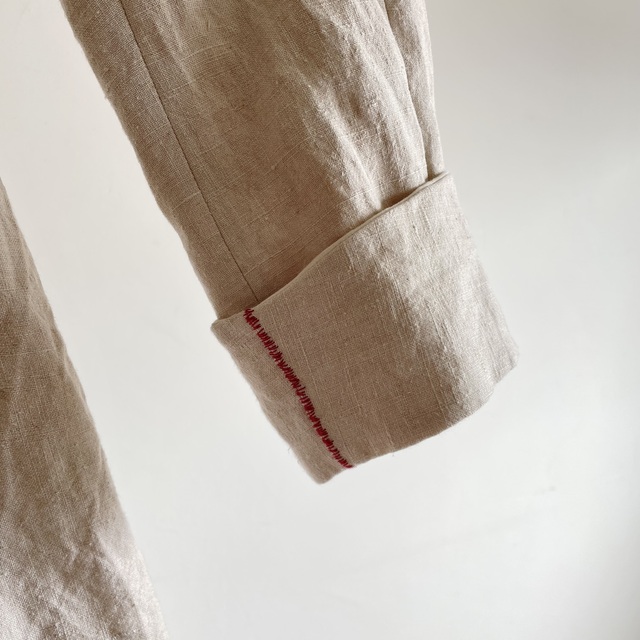
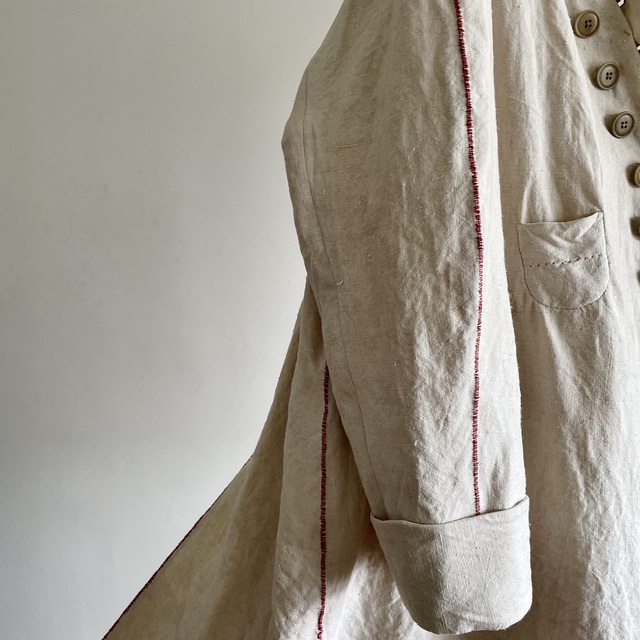
生地は19世紀末頃に、フランスで栽培し、繊維として加工され、糸として紡績され、手動織機で織られたリネンのアンティーク。
The fabric is antique linen grown, processed as fiber, spun as yarn, and woven on a manual loom in France around the end of the 19th century.
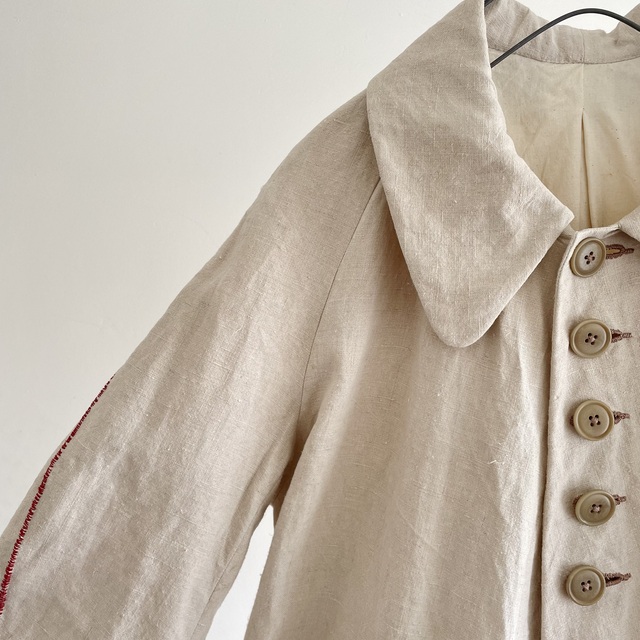
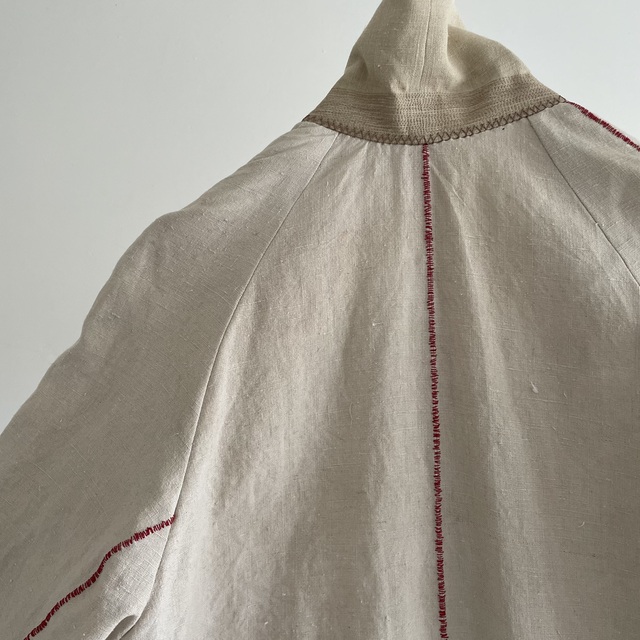
ラスティックなリネンの生地は、Biaudeに使われるVilletteの繊細な表情とは全く違った迫力を持ち、洗練や洒落っ気とは全く違った農業大国フランスの骨太さが伝わる、無骨さと素朴さが溢れています。
The rustic linen fabric has a completely different intensity from the delicate look of Villette used for Biaude, and is full of ruggedness and rusticity that conveys the grit of France, an agricultural powerhouse that is completely different from sophistication and stylishness.
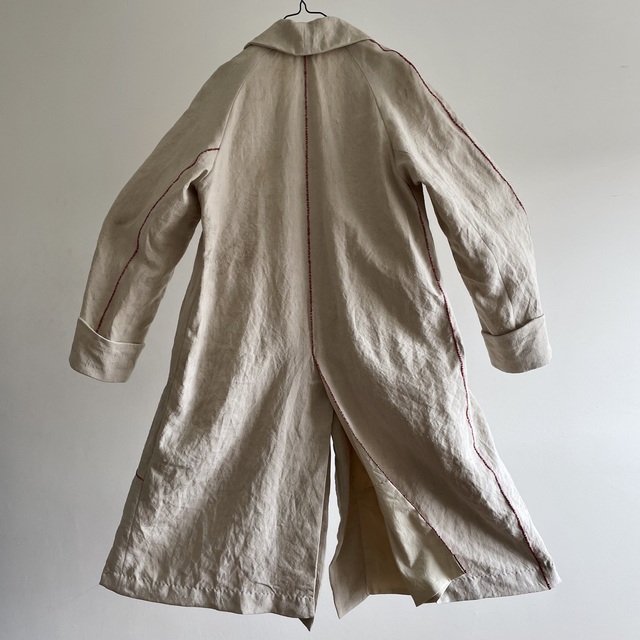
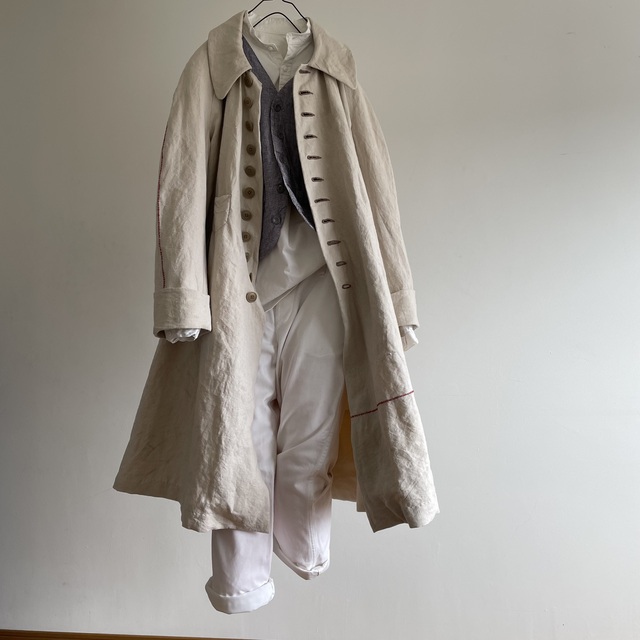
今なお世界のリネン原料のフラックス(亜麻)生産の70%を生み出し続けるフランスは、文字通りのリネン大国です。栽培には温帯から熱帯の気候を必要とするため、綿の栽培が難しいフランスの気候に適した亜麻は、衣類のみならずシーツなどの寝具や寝間着などのホームリネンから、テーブルクロスやナプキンなどのテーブルリネンにも使われフランス人にとっては綿以上に生活に密着した最も身近な繊維です。
France is literally a linen powerhouse, as it still produces 70% of the world’s linen flux (flax). Flax is used not only for clothing, but also for home linens such as sheets and bedclothes, table linens such as tablecloths and napkins, and is the most familiar fiber to French people, more closely related to their daily lives than cotton. It is the most familiar fiber to the French people, more closely related to their daily lives than cotton.
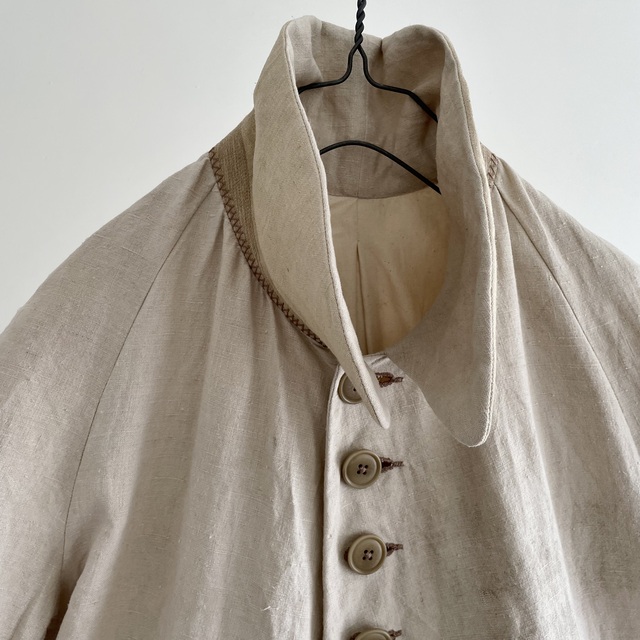
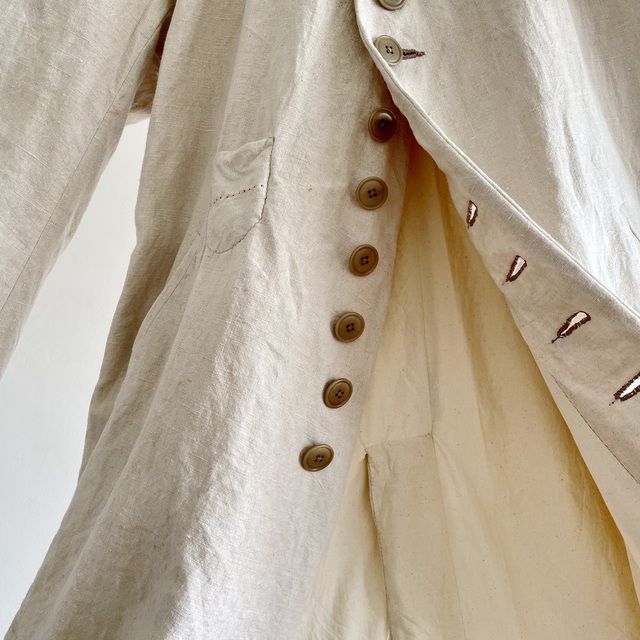
近年では中国などの紡績技術の発展により、原料栽培以外の工程(特に潤紡よる紡糸はほとんど中国)はフランス以外で行われ、リネンを糸にする紡績工程は国外がほとんどとなりました。しかし、この生地が作られた100年以上も前の時代では、フランス国内で栽培、紡績、製織された真正のフレンチリネンと言える生地が作られていました。
In recent years, due to the development of spinning technology in China and other countries, most of the processes other than the cultivation of raw materials (especially the spinning by moisture spinning in China) are done outside of France, and the spinning process to turn linen into yarn is mostly done outside of France. However, more than 100 years ago, when this fabric was made, there were fabrics grown, spun, and woven in France that could be called genuine French linen.
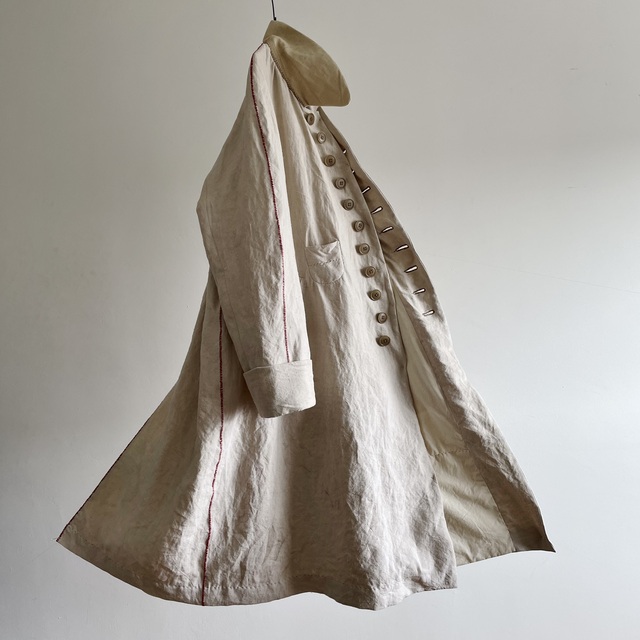
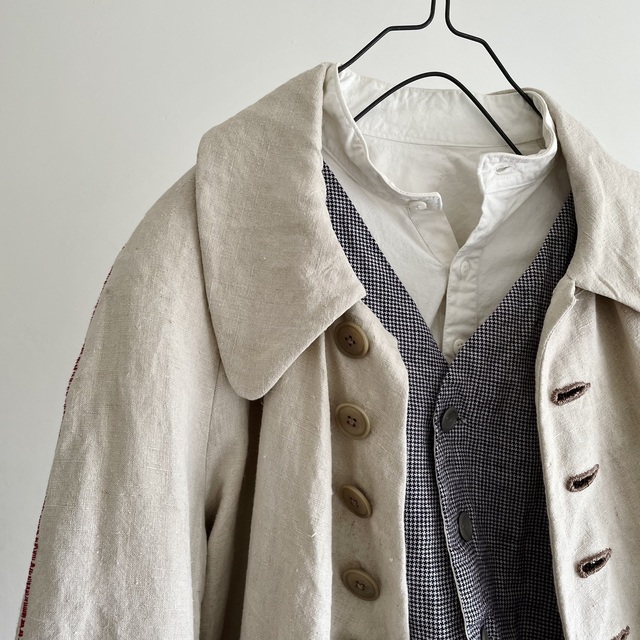
手動織機で織られた野趣溢れる生地と、素朴なEcruの色合いが年月と陽に晒された枯れた色合いが溶け合った趣と存在感に満ちた表情。
The rustic Ecru coloring blends with the wild fabric woven on a manual loom and the withered hues exposed to the sun over the years, creating a look that is full of charm and presence.
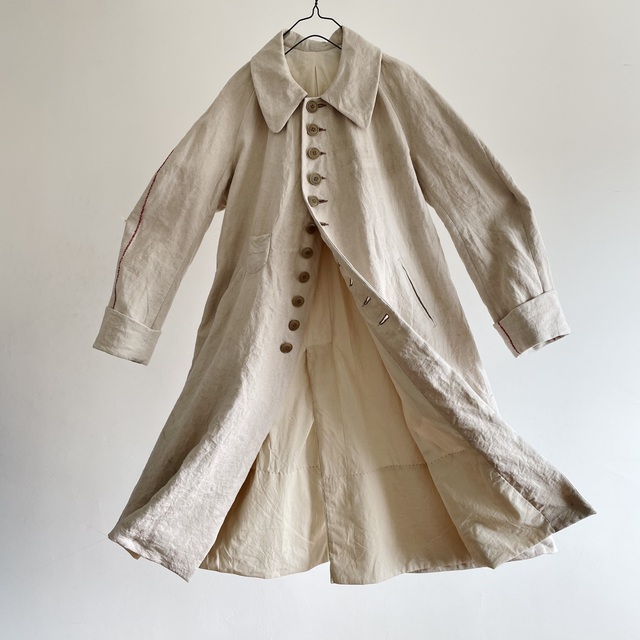
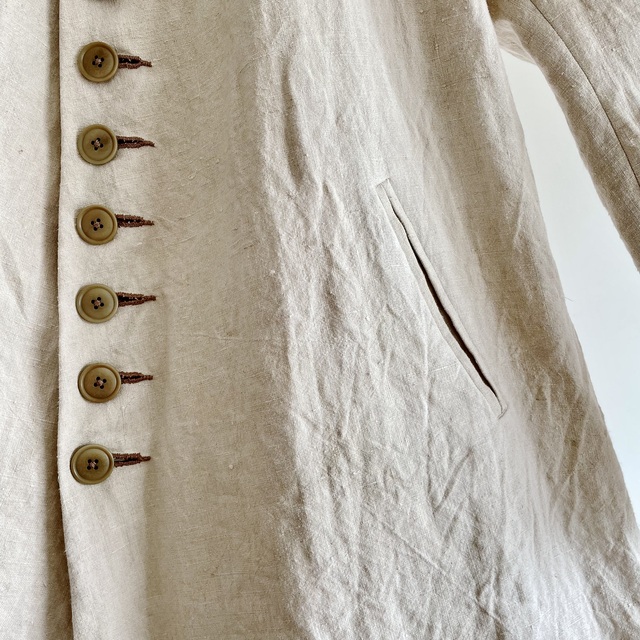
時間による風化、汚れによる滲染、陽灼けによる退色、様々な要素が積み重なった言葉のいらない存在感。
Weathering by time, blotting by dirt, fading by the sun, and various other factors add up to a presence that requires no words.
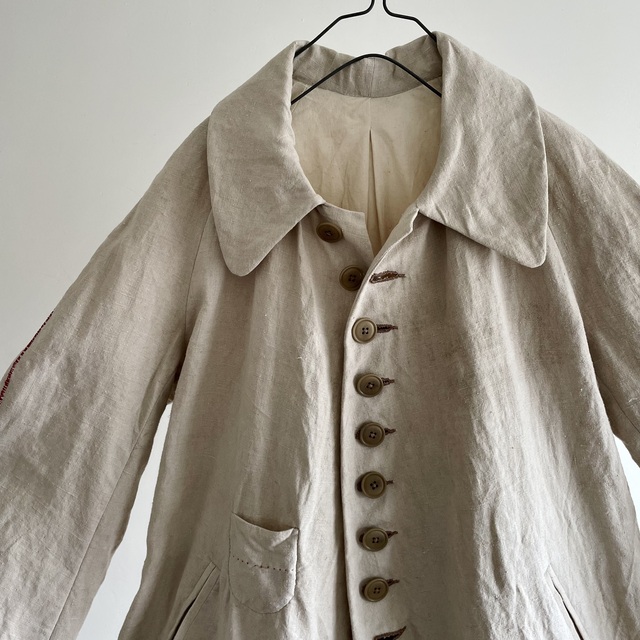
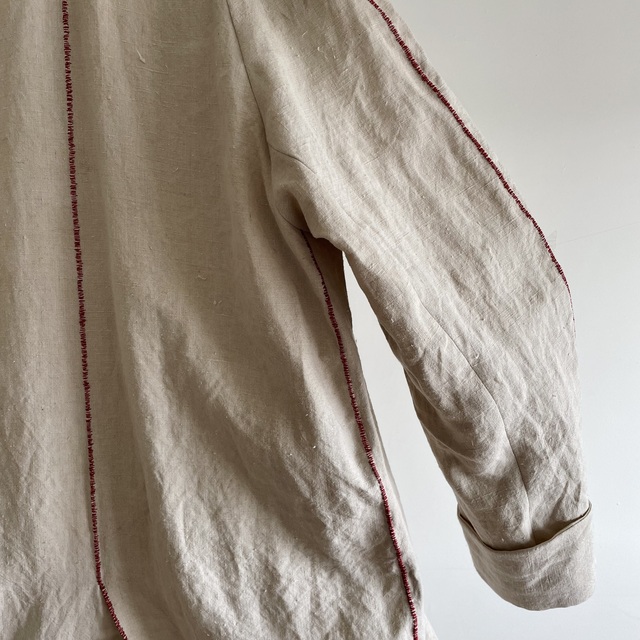
長い時間を経てきた生地に残る時間の痕跡は、意図して作れないものです。
The traces of time that remain in fabrics that have gone through a long period of time cannot be created by intention.
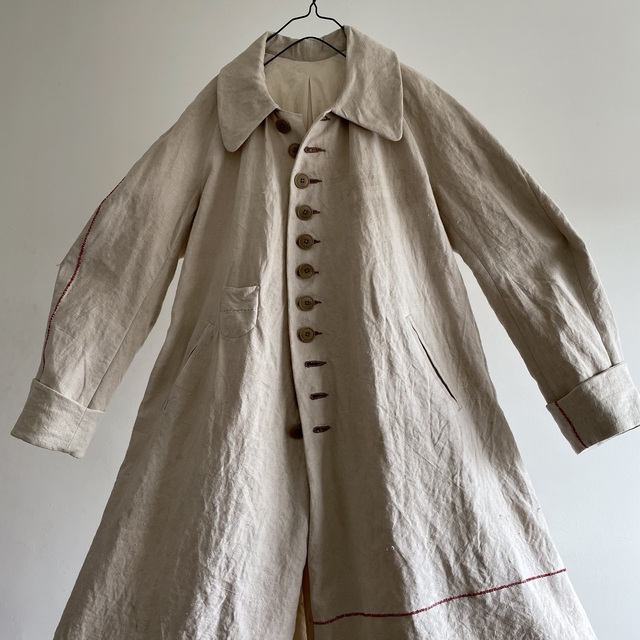
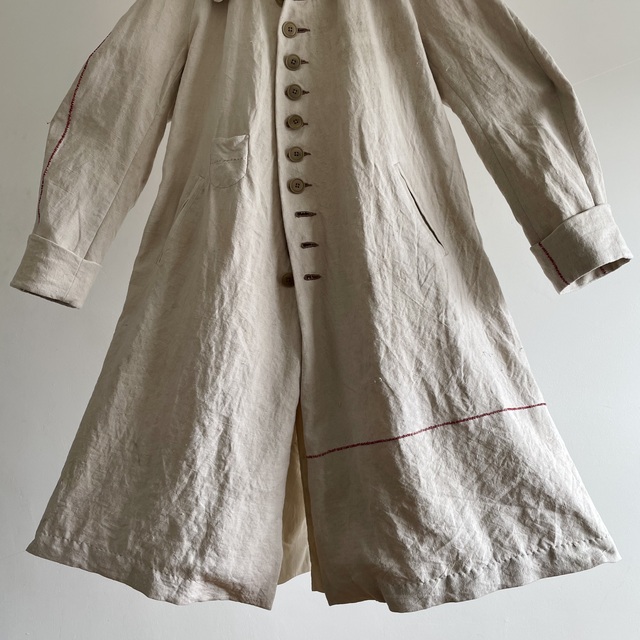
ハンドステッチでのライニング。手の温もりではなくストイックさを伝える不揃いなステッチ、縫い皺の表情や生地のコントラストが乾いた奥行きを作り出します。
Lining with hand stitching. Uneven stitching that conveys stoicism instead of hand warmth, the expression of stitch wrinkles and fabric contrast create a dry depth.
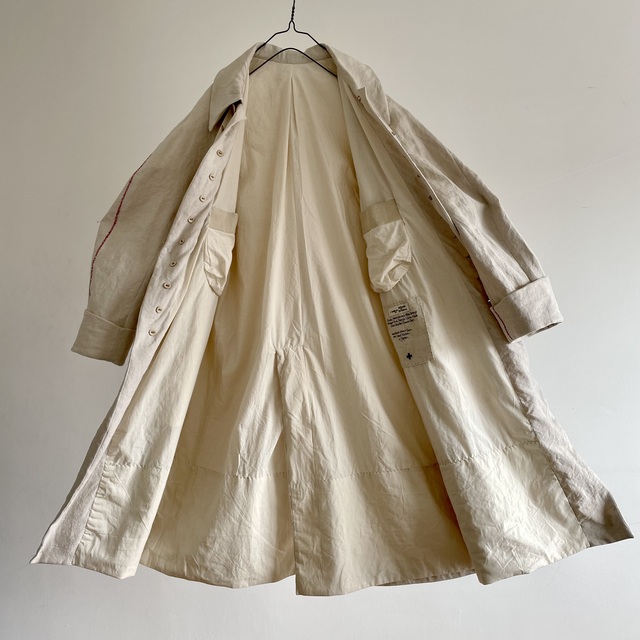
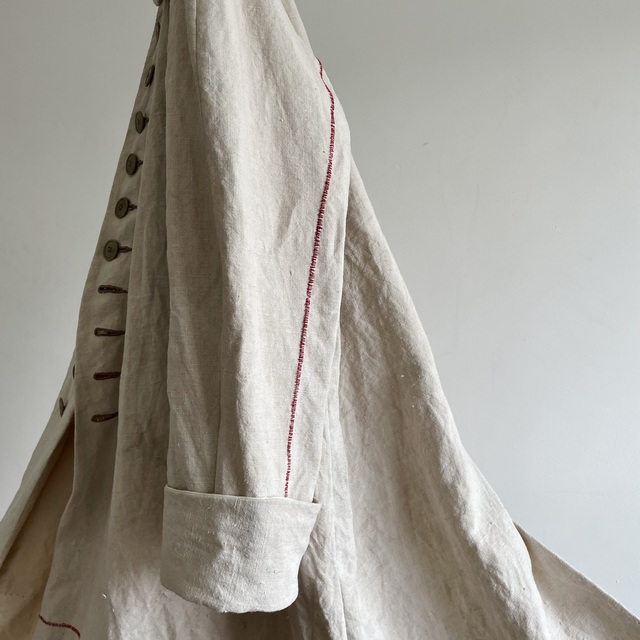
ミシンで縫えば数分の仕事に、その十数倍の時間をかけたことの意味は、きっとあるはず。
Blind stitching by hand to sew the linings together. It must be meaningful that we spent more than ten times as much time on a job that would take only a few minutes if sewn with a sewing machine.
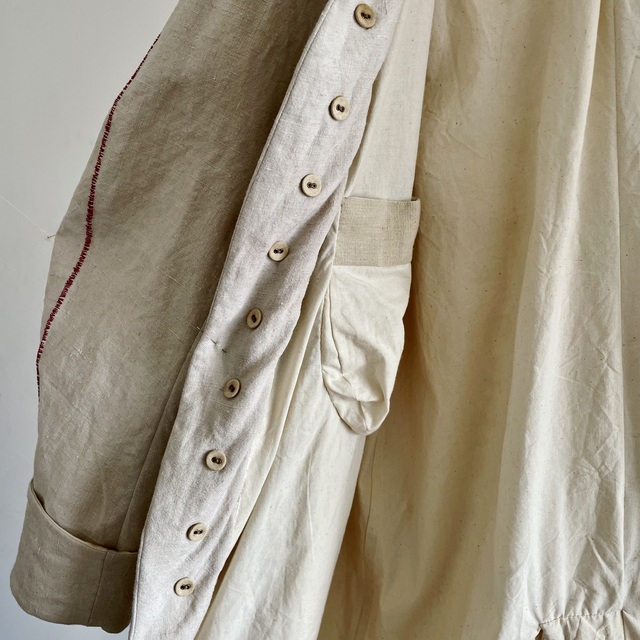
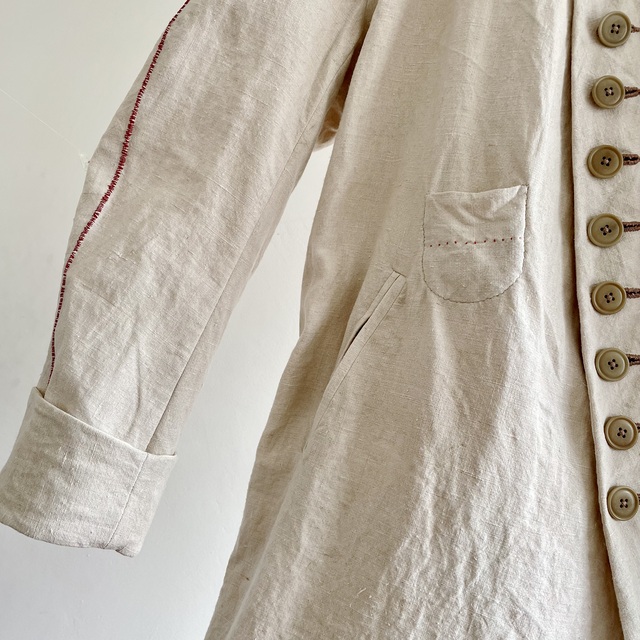
長めの丈に深く切られたベントは、たっぷりとした蹴回し分量をさらに表情豊かに彩ります。
The longer length and deep vents add to the expressiveness of the generous hem volume.
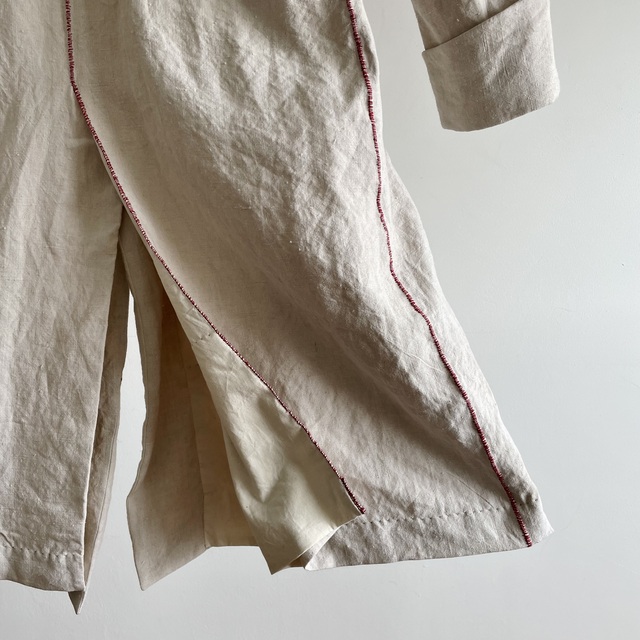
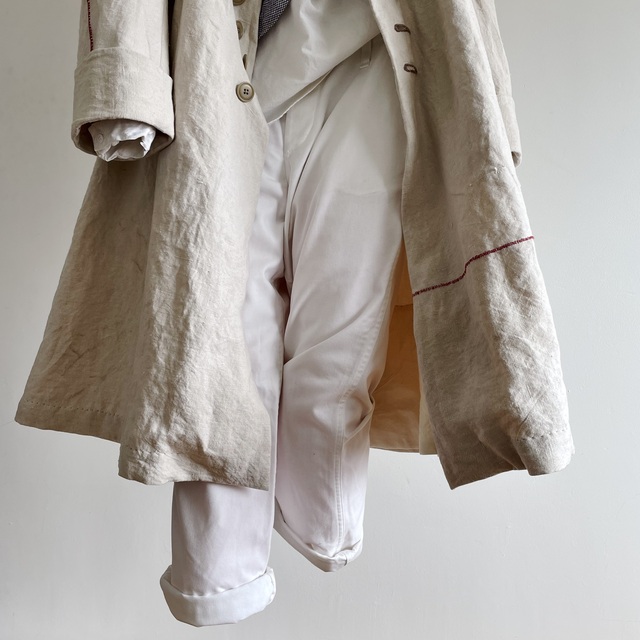
アンティークリネンのポケット口とソフトなフォルムの内ポケット。
Softly shaped interior pocket with antique linen pocket opening.
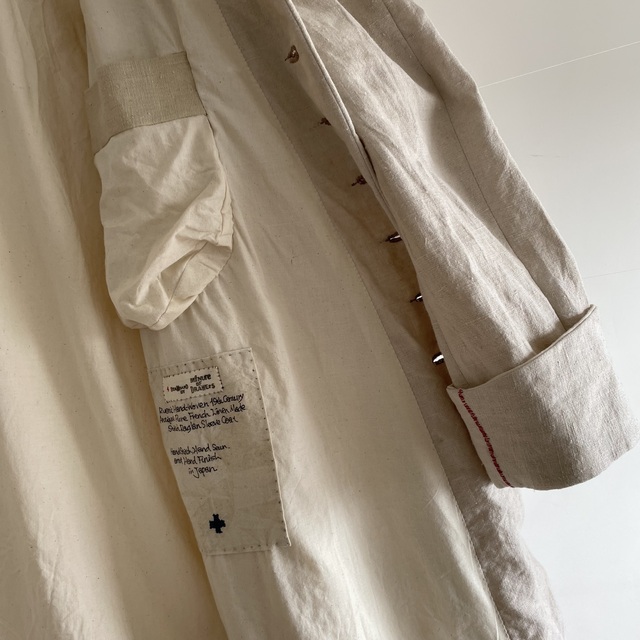
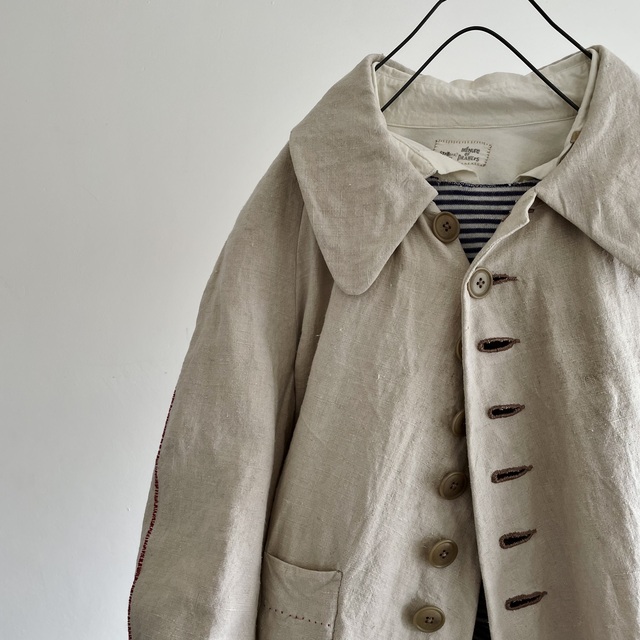
サイドや袖の縫割りの縫い目の一部、裾の生地の継ぎ目に施した手縫のステッチ。控えめに主張する乾いた手仕事。
Hand-stitched stitches on some of the side and sleeve seam allowances, and on the fabric seams at the hem. Dry handwork that discreetly asserts itself.
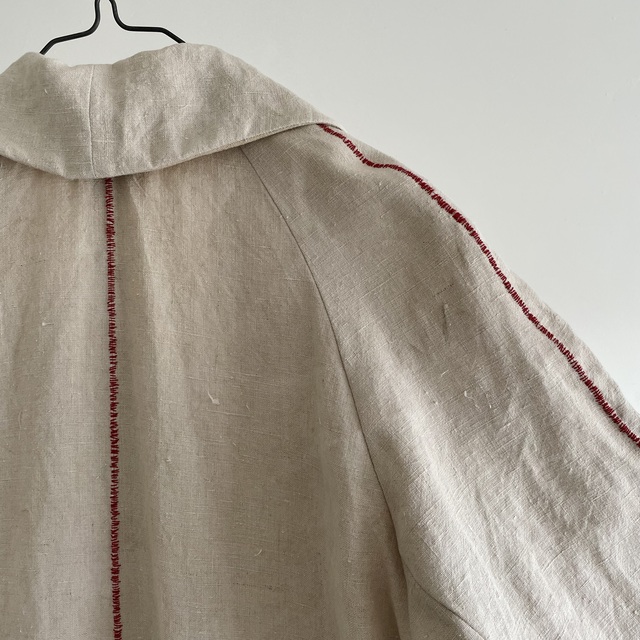
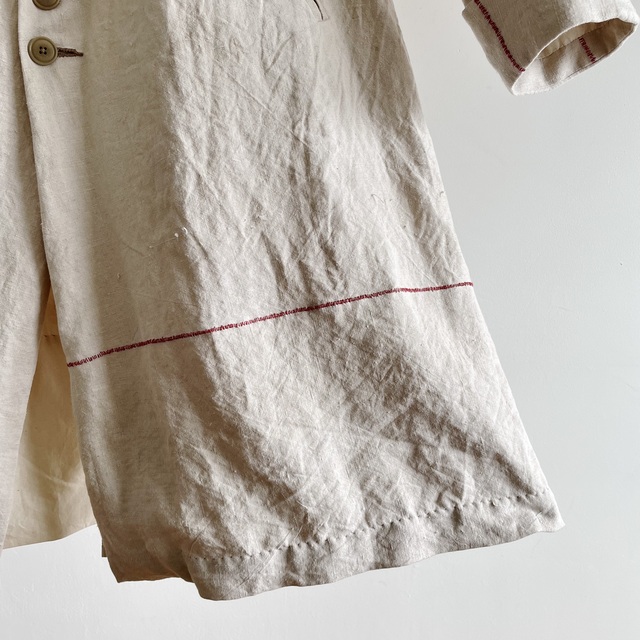
狭めの間隔でずらりと並べたボタンの迫力のある表情。
The powerful look of buttons arranged in a row at narrow intervals.
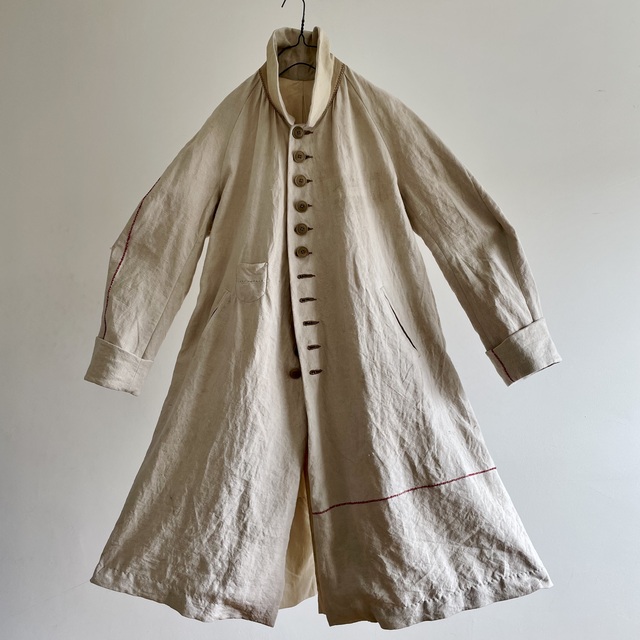
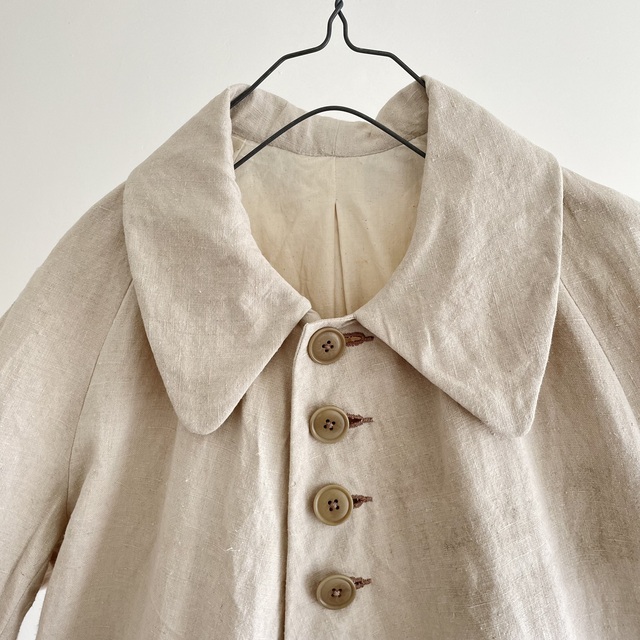
ボタンはフランスのヴィンテージのcorozo(主にエクアドルのタグワ椰子)。実の中の種子の中の胚乳部分を加工して作られた趣のあるボタン。
19世紀から1950年代にかけてのプラスティック開発以前に、滑らかな手触りと硬さ丈夫さ染色性の良さを利用して、盛んに作られていたボタンです。
The buttons are vintage French corozo (mainly tagua palms from Ecuador). These quaint buttons are made by processing the endosperm part of the seeds inside the fruit.
Before the development of plastics from the 19th century to the 1950s, these buttons were actively made to take advantage of their smooth feel, hardness, durability, and dyeability.
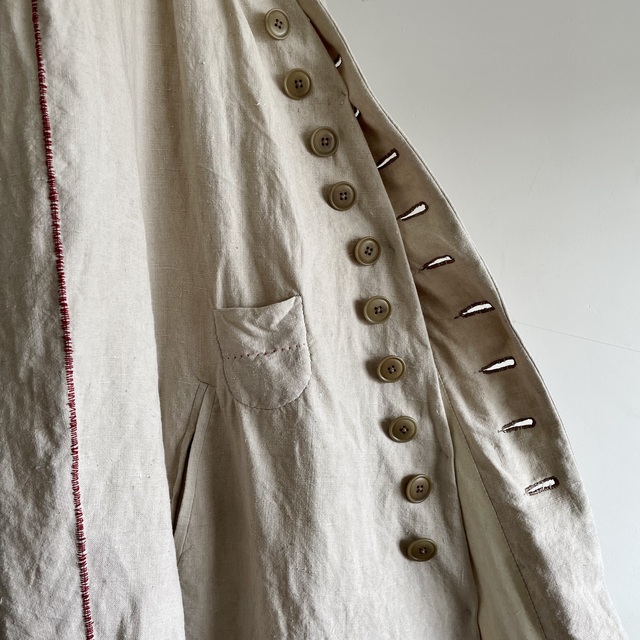
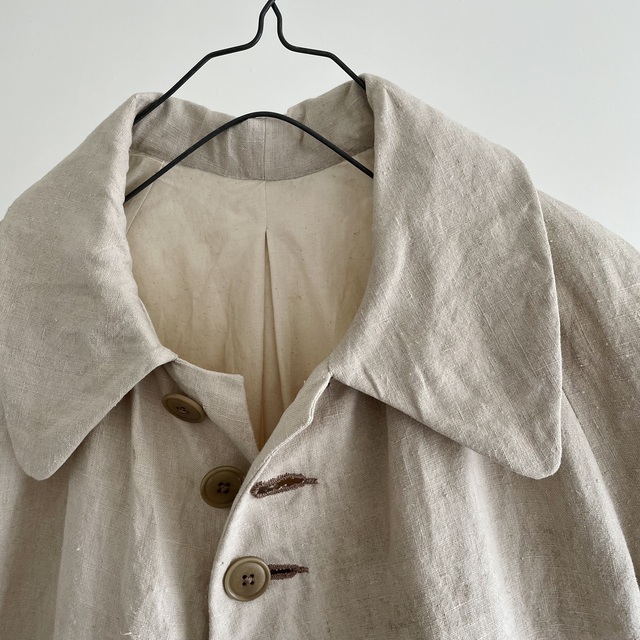
vegetable ivoryの呼び名通りの乳白色の実を削って加工される何とも言えない丸みと、乳白色のベースを染める事で生まれる優しい色合いの魅力。見た目に反してしっかりした質感と重みを兼ね備えた、味わい深さを持ったボタンです。
As the name “vegetable ivory” implies, this button has an indescribable roundness created by shaving milky white berries, and the charm of the gentle coloring produced by dyeing the milky white base. Contrary to its appearance, this button has a solid texture and weight, and has a deep sense of taste.
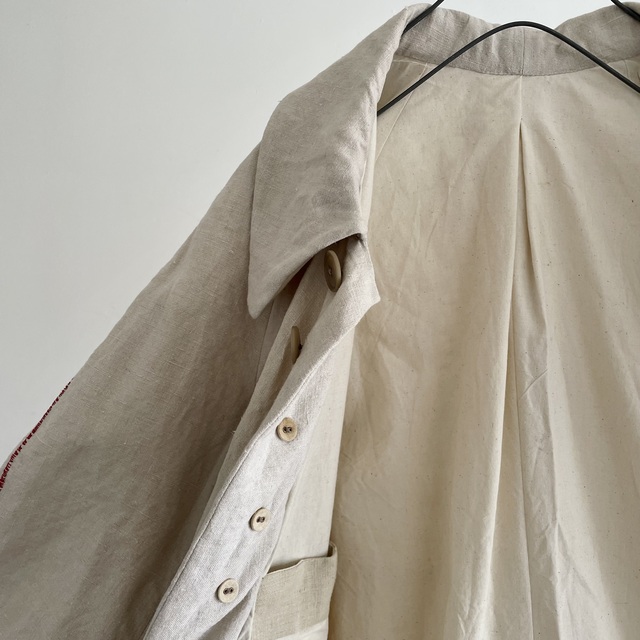
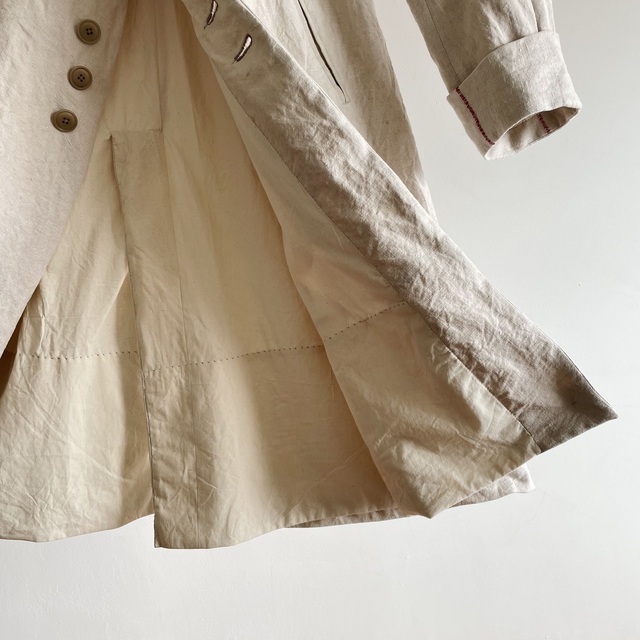
ボタンホールも全て手縫いです
Buttonholes are also all hand-stitched.
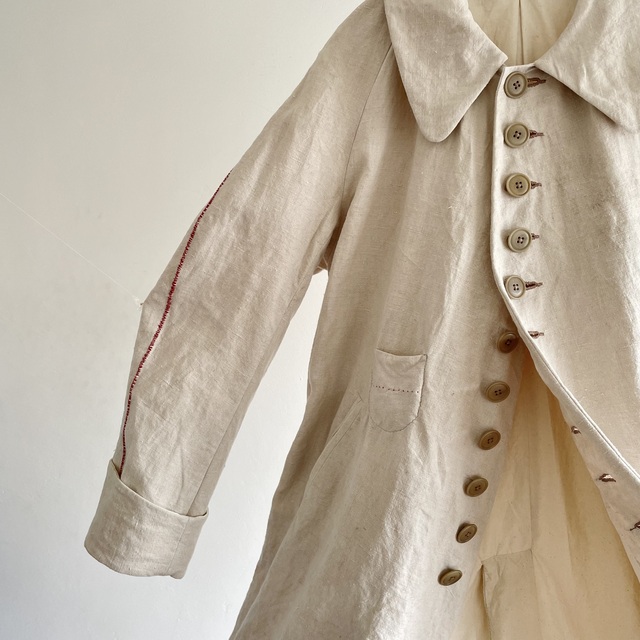
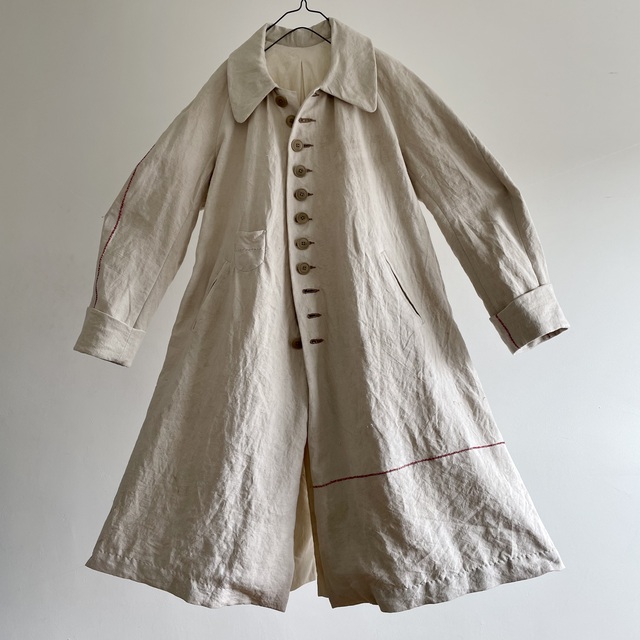
ヘムを軽くするために、止めつけずに浮かせてつけたライニングの裾。適度なボリュームを持たせるために深い見返しをつけ、ハンドステッチでアクセントを添えています。
To lighten the hem, the lining hem is floated instead of sewn. A deep turnover is added to give the right amount of volume, and hand-stitched accents are added.
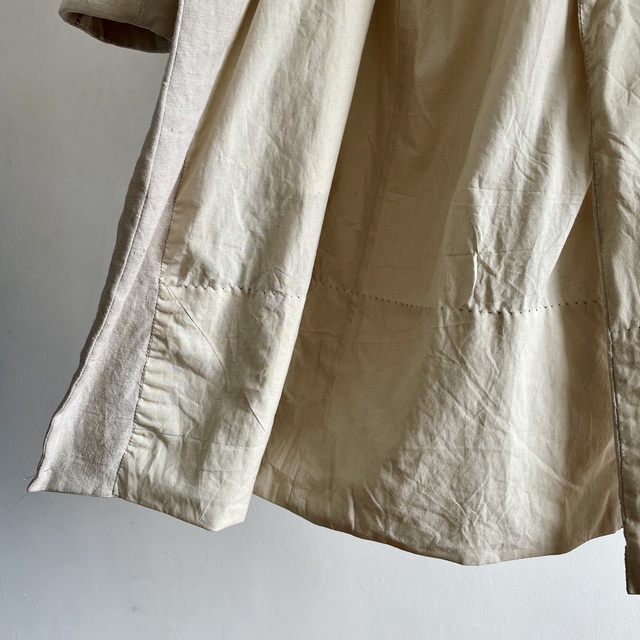
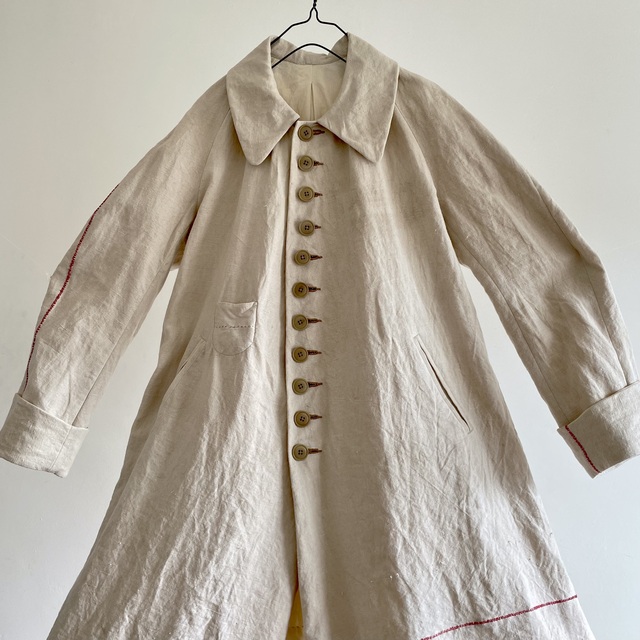
防水、高発汗、強靭、難燃。素材はどんどん高機能になり、形も運動性や作業効率を追求したものへと進化を続けてきましたが、ファッション的には退化しているに違いないワークウェアの世界。近年、独特の際立った独自性がどんどん薄まってしまったり、アイテムそのものが作られなくなってしまったのは残念でなりません。
Waterproof, highly perspiring, tough, flame-resistant. The materials have become more and more sophisticated, and the shapes have continued to evolve in pursuit of mobility and work efficiency, but the world of workwear must be degenerating in terms of fashion. It is unfortunate that in recent years, the distinctive uniqueness of workwear has been fading away, or that the items themselves are no longer being made.
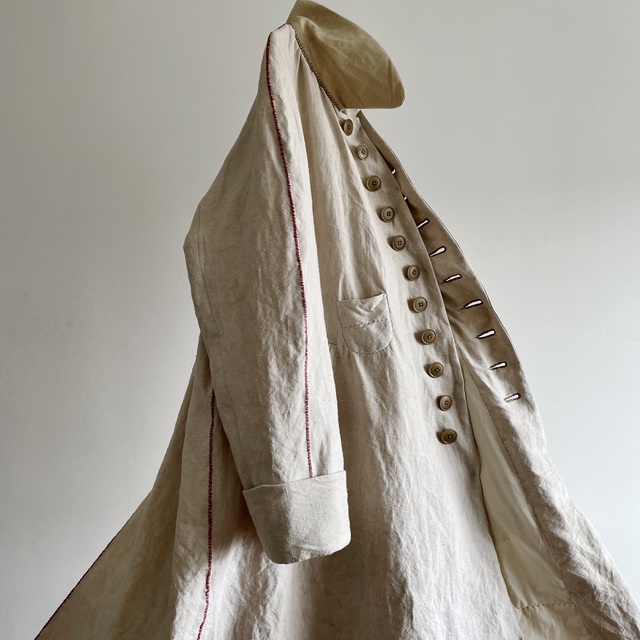
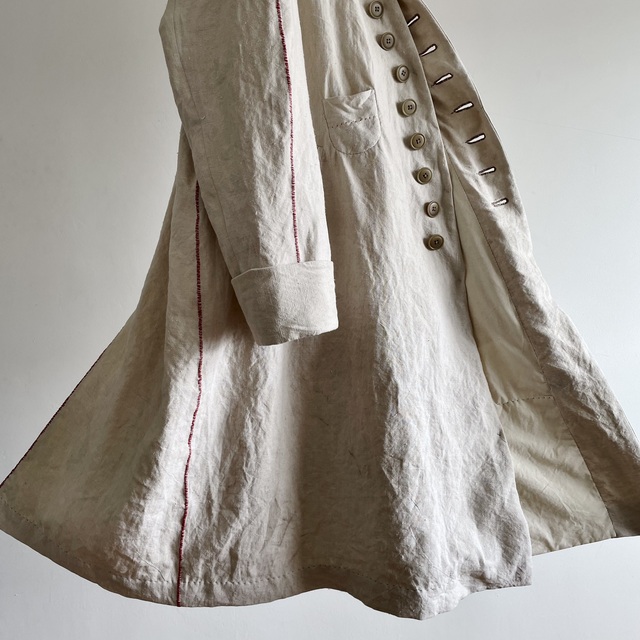
antiqueの生地と、今はもう作られなくなった仕事着のフォルム。そこに乾いた手の仕事と現代性を融合させて作り上げた、コートです。着る人の個性と存在感を際立たせる1着です。
Antique fabric and the form of work clothes that are no longer made. This coat was created by fusing the dry work of hands with modernity. It is a garment that accentuates the individuality and presence of the wearer.
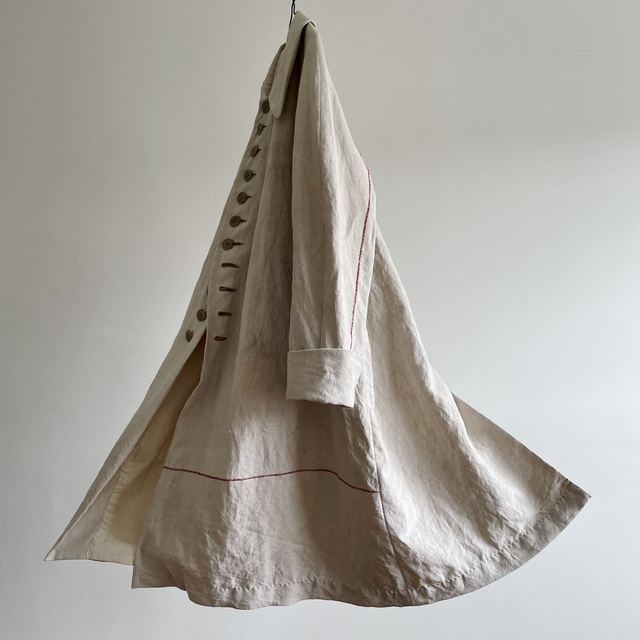
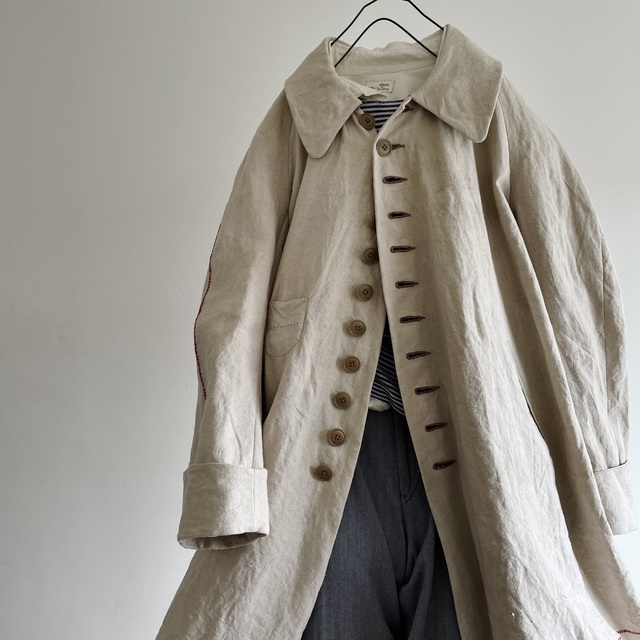
サイズ 2~3
裄丈 = 85cm(肩幅 50cm 袖丈60cm相当)
バスト= 62cm (脇下)
着丈 = 112cm
フランス/日本製
Front Fabric = Antique French Hand Woven Rustic Linen / Linen 100%
Back Fabric = Indian Rustic Cotton Broad Cloth / Cotton100%
Buttons = 1950-1960 Vintage French Corozo Button
& Antique Fabric Covered Button
STOREへのリンク
Rustic Hand-Woven 19th Century Antique Pure French Linen Fabric Made Stitch Raglan-sleeve Coat
[STANDARD By Manure Of Drawers] SOLD

